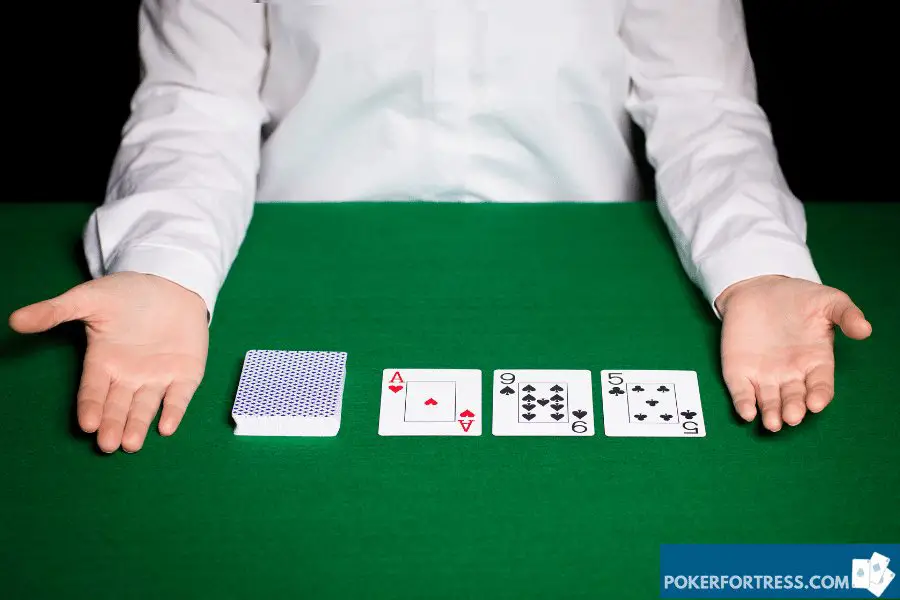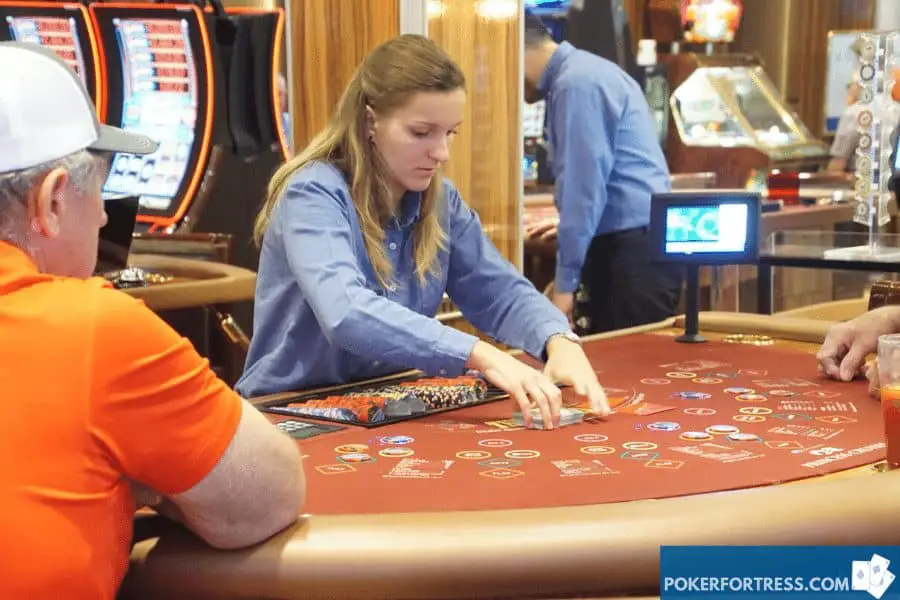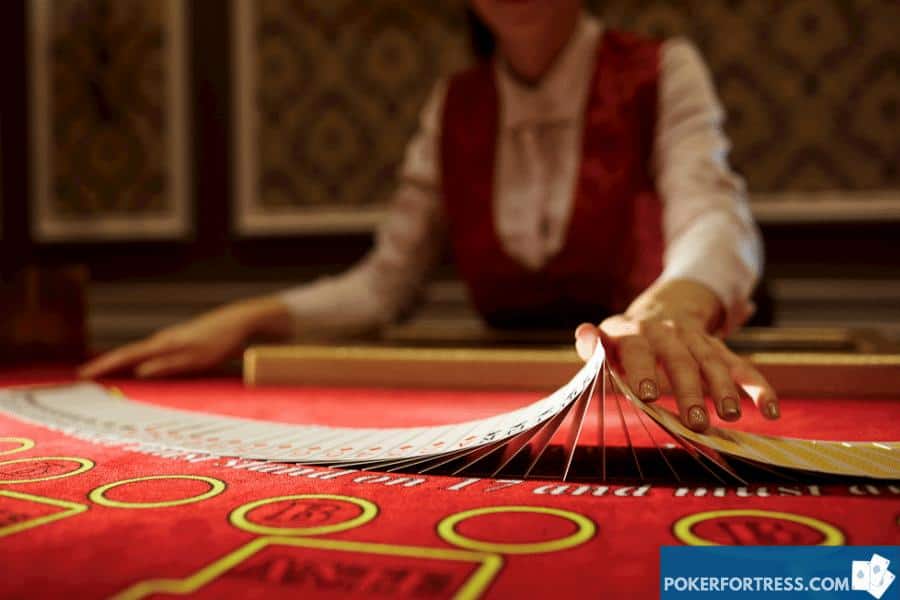A poker dealer’s median hourly rate is $8.37, which is just a few hundred dollars above the poverty line for a two-person household. But why does it seem like they all love their jobs? With such low hourly rates, the tips that dealers receive must be enough to keep their flashy smiles and friendly-vibe, right?
So, do poker dealers keep their tips? Yes, but it’s not as simple as your dealer pocketing all of it. In fact, in most casinos, dealers have a tip pool that they split with every employee for an equal share. Although there are casinos that implement KYO (Keep Your Own) tip, it’s not as widespread because of the imbalance in earnings.

Sure, it’s not a straightforward process, and some would even argue that it’s unfair for dealers, but there’s a thought process behind it. We’ll discuss this topic in great detail, so be sure to stick around before you hand over another tip to your dealer.
Casinos’ Tips Policies
Everyone thinks that they must tip a poker dealer, but tipping is always voluntary, not compulsory. And although we shouldn’t even bother to think about it once we’ve handed it to the dealer, one can’t help but wonder if it’ll be solely for the dealer’s bills. After all, they were the ones who kept us entertained and didn’t make playing poker feel like a chore.
Rest assured, poker dealers will always keep your tips. But if your question is: how much of it will they keep? Well, that one is up for debate, because there are two most common policies that casinos implement when it comes to handling tips:
- tip pooling
- KYO
Tip Pooling
Tip pooling is the most common practice of keeping tips. It’s where all dealers combine everything that they received throughout their shift, then share it equally with other casino employees.
It’s the most common policy that casinos put in place because it creates parity with the paycheck that each dealer takes home. If you’re wondering why it’s important, think about this: a dealer in high stakes poker may receive bigger tips, but they don’t get as many players as the micro stakes table.
That’s not what the casino wants; they want the players to feel entertained whether they’re playing big or small. After all, no one would lightheartedly deal cards all night if they’re only getting a dollar in every pot.
Without tip pooling, some tables will be more rewarding for dealers, while others may feel bad and pass their negativity to the players. Everyone would want to be in the mid-stakes table because that’s where the most tips come from, and dealers will underperform anywhere else.
Keep Your Own

Keep your own (KYO) is another common policy that casinos implement when it comes to keeping tips. A poker dealer, who is performing well, will receive more tips, gets to keep 100% of it and doesn’t have to share with anyone else.
Casinos use this method of keeping tips because it creates a performance-based incentive that encourages poker dealers to do better. The management will then devise a rotation of dealers to ensure that there’s parity, and each dealer will get a chance to be at a mid-stakes table.
The main concern for casinos is to place someone who can bring a positive vibe to every table. When a poker dealer does that, she can expect better tips from the players. It eliminates the discrepancies in handling the tip pool and frees everyone from the complexity of monitoring anyone’s performance. With KYO policy, a better poker dealer will always take home a bigger paycheck—no questions asked!
Pooling vs. KYO
Both policies seem well and good because it helps every poker dealer to make a decent income, while the casino can achieve their goal of making the players feel welcome. It’s win-win for both, right?
Well, you know how they say: you can’t make everyone happy? Well, that’s exactly the case when it comes to keeping tips. Sure one isn’t better than the other, but dealers from both sides of the coin have some concerns about these policies.
Performance

When pooling, tips become a “team effort.” When a poker dealer makes the players feel unwelcomed, everyone’s income is affected. But if she outperforms everyone, it won’t show in her paycheck. Everyone gets paid the same regardless of what they did—the cashier, slot machine attendants, and table dealers—they’ll make the same with tip pooling.
Of course, employees shouldn’t bother about other employees’ tasks, but when their paycheck is interconnected, it creates an unspoken conflict. One reason why some casinos implement KYO is because of a 12-year long legal battle between Wynn Casino and its employees, regarding its tip policies. That’s because, according to the casino policy, even supervisors take a cut from the pool!
It’s debatable whether that’s acceptable or not, and we won’t be taking sides. The reason why we mentioned it is because some casinos don’t want the same attention and hassle. They just want to keep their dealers satisfied that they’ll over-deliver and make sure that players are well-entertained. So they kept their hands off the tips—dealers keep 100%!
Income Parity
KYO eliminates performance issues because a poker dealer’s paycheck depends on individual performance. However, this policy creates one striking disadvantage—income parity. As we’ve discussed, high stakes don’t get as many players, while small stakes tables are always busy but don’t get bigger tips. Sure, the management can rotate their dealers to create some parity, but we all know that in casinos, every day will be different.
Every poker dealer may perform the same, but they don’t get paid the same. With a KYO policy, it’s just impossible to have income parity. Some poker dealers feel like they’re gambling as well because their income will depend on luck. That’s why tip pooling remains to be the most common policy that casinos implement.
Some casinos modified their policy to reduce performance issues, such as keeping the poker tips for poker dealers. And by the way, even after winning the case three times, Wynn Casino still changed its policy to keep the tips solely for dealers.
Poker Tipping Etiquette
Even if you’re not required to tip the dealer, they’re expecting you to do so.
After all, if a casino allows dealers to accept tips, then it makes more than half of their total paycheck. And since they play an important role in keeping you entertained, and, possibly, even brought luck to your hands, it’s just a sign of courtesy to tip your dealer.
So, how much tip is enough for a poker dealer? What’s too little and too much? Well, it’ll depend on several factors, including the number of pots you won, the total amount won, and the length of time you spent at the felt. Poker takes a long time to play, and it won’t make sense to tip the dealer a dollar per hand—even when playing small stakes.

Before you sit down, be prepared to tip at least 15% to 20% of your buy-in chips, not the pot won. That’s the unspoken rule when tipping a poker dealer, and anything below that would be a disservice to them. Of course, if you feel like it, poker dealers will gladly accept more tips, especially if you’ve got hot hands!
By the end of your session expect to tip in a total of away around 15-20% of your initial buyin for several hours of play.
For cash games, if you win the pot of anything less than 10bb (big blinds $2 in $1/$2 games), it is acceptable not to tip. Over that tip 1 small blind, when it comes over 40bb you can tip 1bb or 2bb. If you win over 100bb or 150bb tip 3bb. But you can always observe how much other players tip when you sit down at the table. This will give you a good idea of how much to tip.
Conclusion
Most poker dealers make a minimum of half of their income from tips, and the best way to acknowledge their service is by tipping them. You don’t have to, but you should, regardless of the pot and whether they’re pooling tips or KYO-ing it.
There’s no exact percentage of acceptable tips for dealers, and they’ll appreciate any amount that you can give them. However, it’ll be easier if you’re prepared to hand over 15% to 20% of the buy-in chips. After all, if you feel like giving your dealer a tip, it probably won’t make a dent in your earnings!



